Topics
Category
Era
West Polk County Farm Bureau
In the late 1800s, as diversified farms began to replace large bonanza farms in Minnesota and across the U.S., Polk County farmers realized they needed help. National groups with local branches, like the Farm Bureau, formed to help farmers organize and improve their representation in laws and education. Farmers in the western part of Polk County—a particularly fertile area due to the Red River Valley’s rich topsoil—came to rely on their farm organizations as they adapted to the rising cost of transporting produce to city markets.
The Polk County Farm Bureau officially organized on December 20, 1917, in order to secure a county agent. Its members knew that such an agent would help them learn the latest farming techniques and teach their children better, more cost-effective farming practices. There were 451 founding members, with annual dues set at two dollars per member. After they helped to create the necessary extension service, county agent R. W. Van Scoik was elected on February 15, 1918, and began work.
In June 1926, the Bureau split into two different groups: one representing East Polk County and another representing West Polk County. Herman Skyberg served as the western branch’s first president.
In the late 1920s, the West Polk County Farm Bureau gathered in Crookston for its first annual county meeting and picnic. The event drew over 1,200 people, including women and children. Aware that their families were crucial to their farms’ success, farmers encouraged their relatives to become involved with the organization’s inner workings. They also created resolutions during their monthly meetings that helped guide legislators to pass new laws. These eased the burden of expenses related to seeds, implements, hired help, and transportation.
During and after the Great Depression, some Polk County farmers lost their farms. As a result, the Farm Bureau gained traction with dissatisfied farmers eager for change, many of whom also aligned themselves with the county’s 4-H clubs. In 1937, they expected 2,500 people attendees at their annual picnic.
In the early 1940s, the West Polk County Farm Bureau profiled prominent farmers in local newspapers. Two of the organization’s sixteen directors were women. In 1948, it backed 90-percent-parity-price support (adjusting commodity prices so that farmers could earn incomes comparable to other workers’). A year later, Arnold Gredvig represented Polk County when he became the Minnesota Farm Bureau’s director.
The Farmers Union was an organization that rose to prominence alongside the Farm Bureau. Unlike the majority-Republican Bureau, this new group was backed by Democratic Farmer–Labor lawmakers. On December 15, 1954, 125 West Polk Farm Bureau delegates met with Democratic legislator Coya Knutson from neighboring Red Lake County. In the 1950s, the Bureau’s membership tripled from its earlier numbers in the 1920s.
In November 1964, the Farm Bureau criticized the Commodity Credit Corporation’s (CCC’s) sale of wheat on the open market, which kept farm-commodity prices low. The Farm Bureau took the position that the CCC should not sell farmers’ wheat at market price and urged it not to sell for less than $2.50 a bushel, plus storage and administrative costs. By the late 1960s, membership had fallen below its 1950s levels. Laws, economics, the world market, and the costs of doing farm business had changed. A delegation from West Polk County took a trip to Washington, D.C., to meet with leaders.
West Polk County Farm Bureau members participated in workshops at Red River Valley Winter Shows (farming education exhibitions) in the 1960s and 1970s. The Bureau’s women remained active, organizing baking contests and hosting rural-urban banquets. Irene Wachter Jobe, the Bureau’s women’s chair, put out a call to action in the organization’s October 1967 newsletter. She encouraged members to draft sound resolutions at their annual meeting that would represent their needs to legislators. Political awareness, she argued, strengthened their commitment to “fighting for a fair shake for the farmer.”
In the mid-1980s, the Farm Bureau and the Farmers Union both sent farm reform recommendations to President Ronald Reagan. Though the organizations disagreed along partisan lines, Farm Bureau and Farmers union members alike knew they needed a unified voice to express their concerns to government leaders.
In the late 1990s and early 2000s, membership in Farm Bureaus declined as large, corporate family farms replaced smaller farms.
Bibliography
“A Short History of Farm Bureau.” Minnesota Farm Bureau News, October 1962.
Anderson, James. “Farm Bureau Backs 90 Percent Parity Supports.” Crookston Daily Times, November 18, 1948.
“Country, City Women Unite at Farm Bureau Luncheon.” Crookston Daily Times, May 11, 1983.
“Directors of West Polk County Farm Bureau.” Crookston Daily Times, October 25, 1940.
“Diversified Farming.” Crookston Weekly Times, July 15, 1893.
“Drainage Defeated.” Crookston Weekly Times, July 15, 1893.
“Editorially Speaking: Principles of Freedom.” Crookston Daily Times, August 3, 1972.
“Farm Bureau Agent to be Chosen Here: No Action Taken at Last Night’s Meeting at McIntosh.” Crookston Daily Times, April 12, 1928.
“Farm Bureau Baking, Poster Contest Set.” Crookston Daily Times, May 13, 1968.
“Farm Bureau Envisions Membership of 1,000 in West Polk: Fairfax–Andover Club Was Pioneer in Extension Field.” Crookston Daily Times, October 25, 1940.
“Farm Bureau Leaders from 9 Counties Meet.” Crookston Daily Times, April 8, 1954.
“Farm Bureau Members to Host City Businessmen.” Crookston Daily Times, March 11, 1968.
“Farm Bureau Relations Under Fire: County Agent Influencing Denied Here.” Crookston Daily Times, December 27, 1951.
“Farm Bureau Turned Down; 1919 Tax Levy Is Announced.” Crookston Weekly Times, July 19, 1919.
“Farm Bureau Women Name Winners in Baking Contest.” Crookston Daily Times, May 21, 1971.
“Farmers of Polk County Will Assemble in Mass Meeting Here on Saturday March 2nd.” Crookston Weekly Times, February 23, 1901.
“Farmers to Organize.” Crookston Weekly Times, December 5, 1903.
“Figures show What Farm Bureau Is Doing to Help Farmers Market Products.” Crookston Weekly Times, August 27, 1921.
“Grain Rates: A Case That Has Attained a National Reputation Is Practically Settled.” Crookston Weekly Times, June 25, 1898.
“Hines Out: Jim Hill Can Now Refuse to Give the Farmers’ Railroad Hustler a Pass.” Crookston Weekly Times, January 16, 1897.
“Plans of the Soo.” Crookston Weekly Times, May 6, 1905.
“Polk County Farm Bureau Must Not Die.” Crookston Weekly Times, December 27, 1919.
“Preserve Individual Freedoms, Speaker Urges Audience Here.” Crookston Daily Times, April 6, 1962.
“Some Mistakes: Some Words of Caution from a Practical Farmer Worth Considering.” Crookston Weekly Times, January, 16, 1897.
“West Polk Farm Bureau Calls for Tax Reform.” Crookston Daily Times, November 4, 1963.
“West Polk FB Hears of Tax Reform Benefits.” Crookston Daily Times, November 6, 1967.
“Why is It? Fertile Farmer Asks Questions Difficult to Answer.” Crookston Weekly Times, February 8, 1896.
“11,963 Callers Lay Problems before Agent.” Crookston Daily Times, October 25, 1940.
Related Resources
Primary
P3018
Correspondence, 1919 July–August.
Manuscript Collection, Minnesota Historical Society, St. Paul
Description: Minnesota Farm Bureau Federation correspondence relating to the organization of the state and national Farm Bureau Federations.
“Democratic Principals Used In Forming Bureau Program.” Crookston Daily Times, October 25, 1940.
“Farm Bureau Creed.” Crookston Daily Times, October 25, 1940.
“Farm Bureau Meeting is Here Today.” Crookston Daily Times, November 18, 1948.
OH 76
Minnesota Farm Economy Oral History Project: Interview with Gloria Tepfer
Oral History Collection, Minnesota Historical Society, St. Paul
http://collections.mnhs.org/cms/display.php?irn=10308721
Description: Oral history interview of Gloria Tepfer, with comments by Wendy Tepfer Kluver, conducted by Margaret Robertson in Danube, Minnesota on April 11, 1989. Tepfer and her husband farmed outside of Danube, Minnesota, and Tepfer was active in farm organizations including the Renville County Farm Bureau. Full transcript is available online; cassettes and video recordings are available at the MHS Library.
Secondary
"7,439 and Counting: Century Farms Honor Minnesota's Agricultural Heritage." Minnesota History Interpreter 29, no. 4 (May 2001): 1–2.
http://www2.mnhs.org/about/publications/interpreter/may2001.pdf
Campbell, Christiana McFadyen. The Farm Bureau and the New Deal: A Study of the Making of National Farm Policy, 1933–40. Urbana, IL: University of Illinois Press, 1962.
Kile, Orville Merton. The Farm Bureau through Three Decades. Baltimore: Waverly Press, ca. 1948.
Web
American Farm Bureau Federation.
www.fb.org
Minnesota Farm Bureau.
www.fbmn.org
Related Images
Third annual Ninth District Farm Bureau Women’s workshop at the Winter Shows, 1960. First row: Mrs. Daby, Strickler, Jobe, Thorsen. Second row: Mrs. Pyle, Mattson, Thureen, Hanson, Jurchen, Wm. Strickler, Geddes, Peterson. Third row: Mrs. Dragseth, Theo, Thureen. Fourth row: Mrs. Gorter, Wallin, W. Ross, Thorsen.
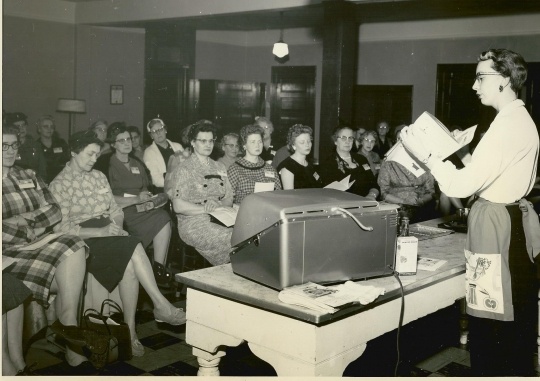
Farm Bureau workshop
Lois Fankhanel teaching a class at a workshop for Farm Bureau women, 1960.
Holding Location
Articles
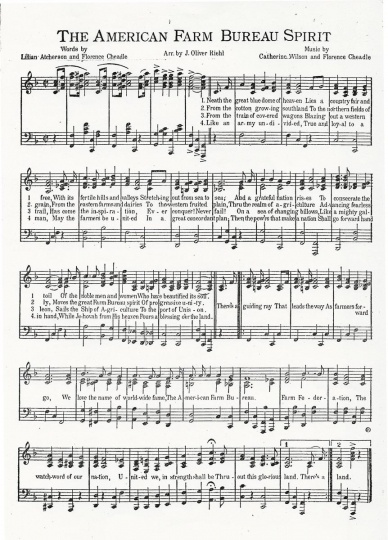
“American Farm Bureau Spirit” sheet music
Sheet music showing the four verses of “American Farm Bureau Spirit,” written by Lillian Atcherson and Florence Cheadle, 1930.
Holding Location
Articles
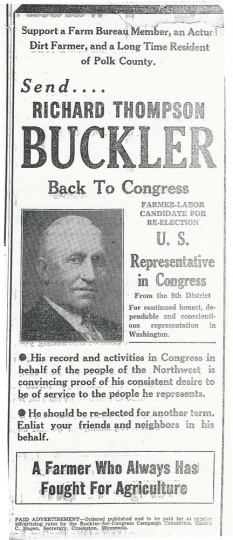
Richard T. Buckler pamphlet
Pamphlet promoting Richard Thompson Buckler, a Farm Bureau member, for re-election to the U.S. House of Representatives.
Holding Location
Articles
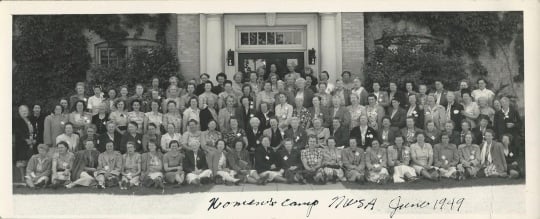
Women’s Camp at Northwest School of Agriculture (NWSA)
The NWSA’s camp for farmers’ wives, hosted by the Farm Bureau on the NWSA campus, June 7–9, 1949.
Holding Location
Articles
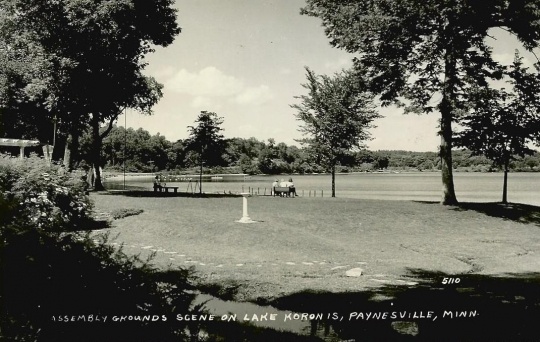
1950s postcard of Farm Bureau camp site
Postcard depicting the assembly grounds of the Farmers’ Bureau camp at Lake Koronis near Paynesville, Minnesota, ca. 1950s.
Holding Location
Articles
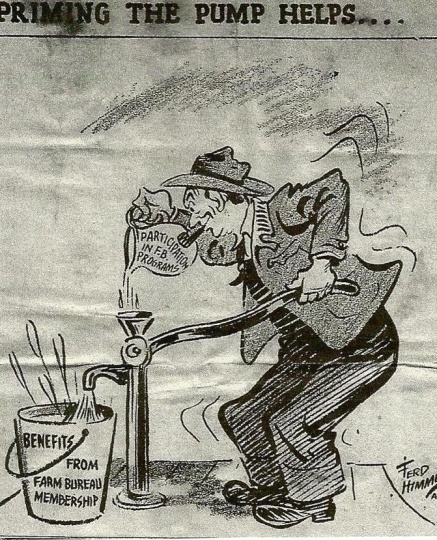
Pro-Farm Bureau cartoon
Cartoon supporting the Farm Bureau, 1955.
Holding Location
Articles
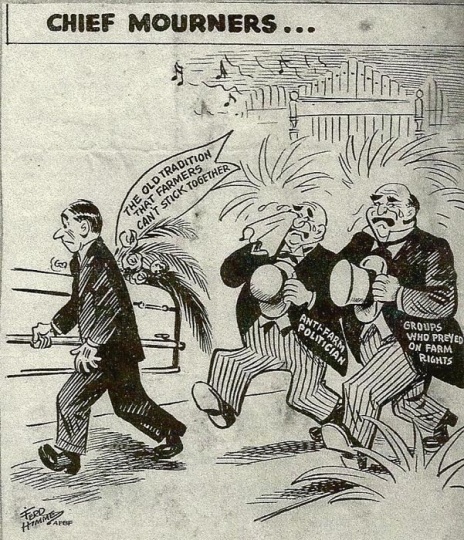
Farm Bureau cartoon critical of anti-farm politicians
Pro-Farm Bureau cartoon critical of anti-farm politicians, 1955.
Holding Location
Articles
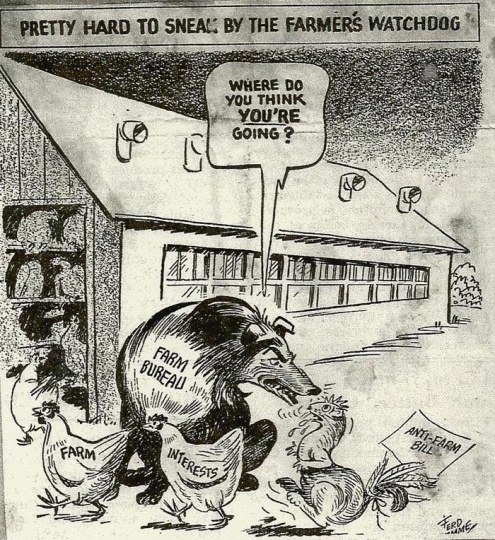
Cartoon with Farm Bureau watchdog
Cartoon with Farm Bureau watchdog, 1955.
Holding Location
Articles
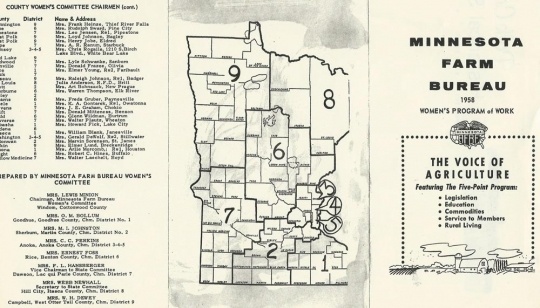
Women’s program of work brochure
Women’s program of work brochure, Minnesota Farm Bureau, 1958.
Holding Location
Articles
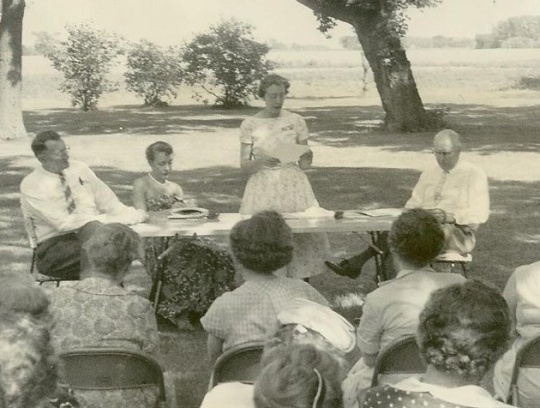
1958 Rural-Urban Tour picnic
1958 Rural-Urban Tour picnic, featuring Cliff Pyle (moderator); Gloria Jenson (consumer); Art Tweet (grocers’ problems); and Mrs. William Ewing (farmers’ problems).
Holding Location
Articles

Irene Wachter Jobe, Jean Strickler, and Mrs. Robert Wurdan
Irene Wachter Jobe, Jean Strickler, and Mrs. Robert Wurdan, 1959.
Holding Location
Articles
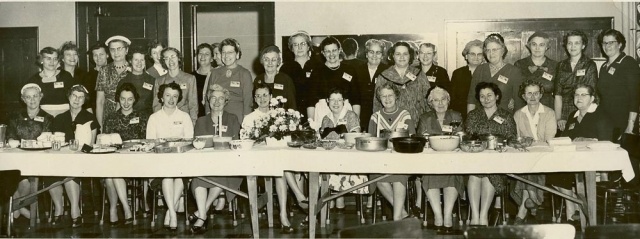
District Farm Bureau Women’s Workshop
District Farm Bureau Women’s Workshop during Red River Valley Winter Shows, 1959.
Holding Location
Articles
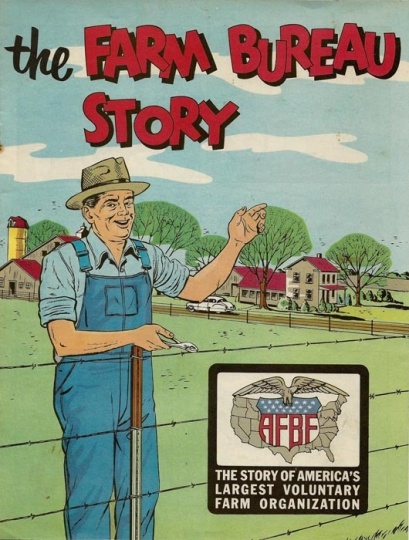
Farm Bureau story booklet
Farm Bureau story booklet, 1950s.
Holding Location
Articles
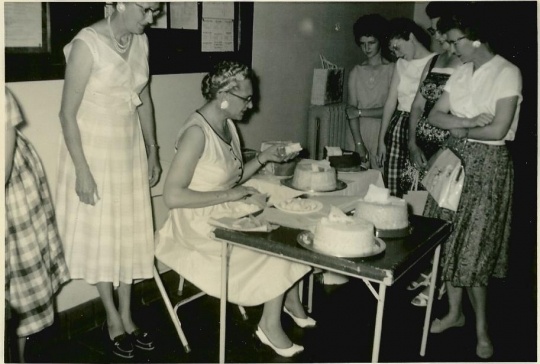
Farm Bureau cake contest
Farm Bureau cake contest, 1960, with Mrs. Milford Peterson (seated) as judge.
Holding Location
Articles
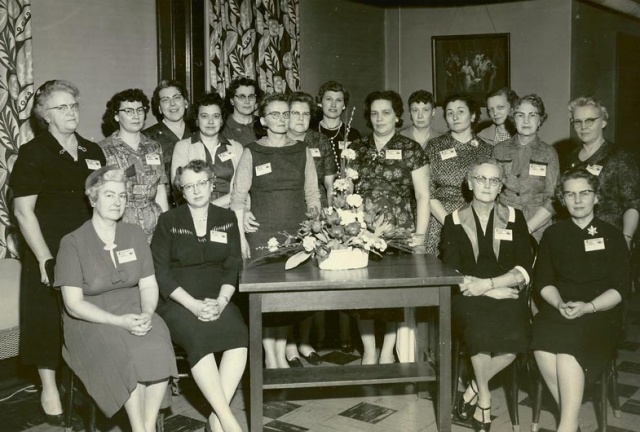
Third annual Ninth District Farm Bureau Women’s workshop
Third annual Ninth District Farm Bureau Women’s workshop at the Winter Shows, 1960. First row: Mrs. Daby, Strickler, Jobe, Thorsen. Second row: Mrs. Pyle, Mattson, Thureen, Hanson, Jurchen, Wm. Strickler, Geddes, Peterson. Third row: Mrs. Dragseth, Theo, Thureen. Fourth row: Mrs. Gorter, Wallin, W. Ross, Thorsen.
Holding Location
Articles
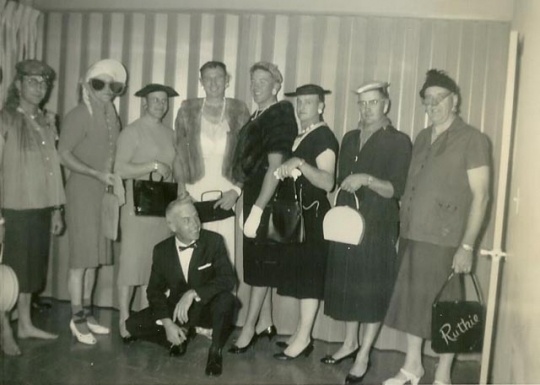
Farm Bureau men in fashion show
Attendees of the 1962 annual meeting perform a fashion show. Pictured are (from left to right): Gerhard Ross, unknown, Charlie Sylvester, Alton Arness (kneeling), Armin Ross, Allen Dragseth, Chet Morken, Marlin Knutson, Elmer Bredlie.
Holding Location
Articles
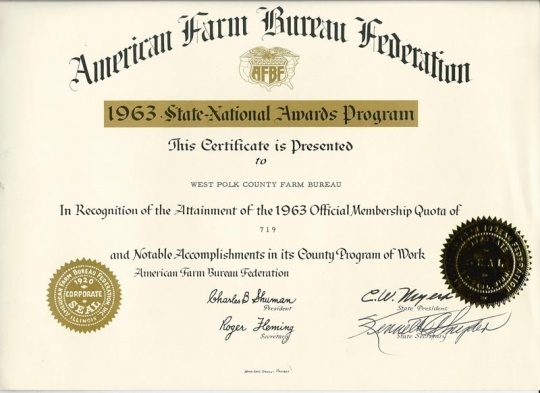
Certificate presented to West Polk County Farm Bureau
National Farm Bureau certificate recognizing the West Polk County Farm Bureau’s 719 members, 1963.
Holding Location
Articles
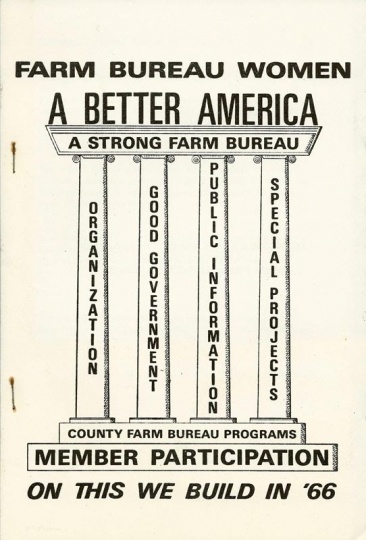
Farm Bureau women’s programs pamphlet cover
Cover of a pamphlet about the Farm Bureau women’s programs, 1966.
Holding Location
Articles
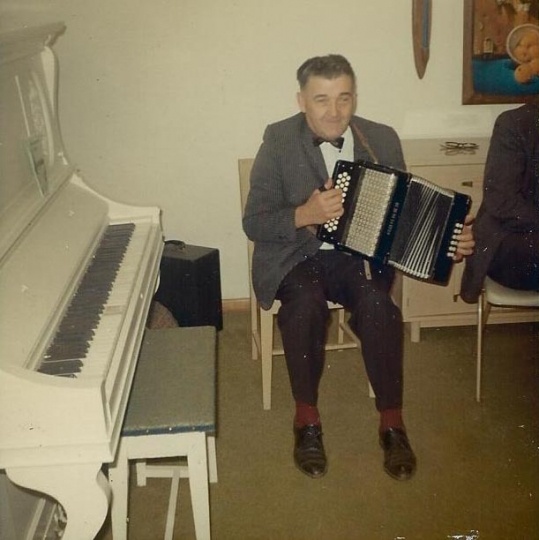
Bruno Jurchen with his “Old Faithful” squeezebox
Bruno Jurchen with his “Old Faithful” squeezebox, 1967.
Holding Location
Articles
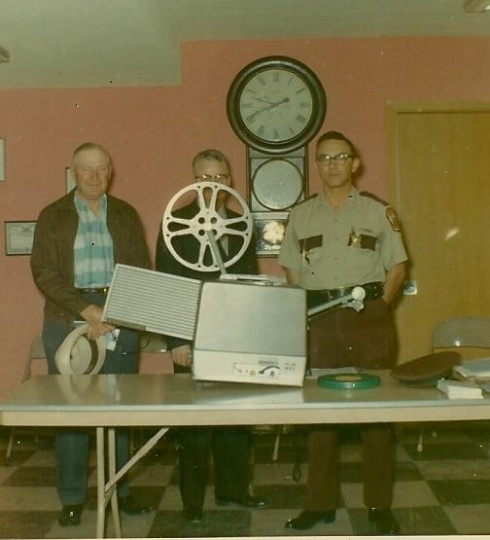
Henry Jobe and Harold Thorson with highway patrol officer
Henry Jobe and Harold Thorson at a special demonstration about slow-moving vehicle signs for farm implements and tractors, 1967.
Holding Location
Articles
Related Articles
Turning Point
During the 1950s, the West Polk County Farm Bureau’s membership triples from its 1920s levels.
Chronology
December 20, 1917
March 1921
1921
June 1926
1929
December 1930
May 1937
June 1937
October 25, 1940
November 1948
July 1949
December 15, 1954
1961
November 3, 1964
October 1967
Bibliography
“A Short History of Farm Bureau.” Minnesota Farm Bureau News, October 1962.
Anderson, James. “Farm Bureau Backs 90 Percent Parity Supports.” Crookston Daily Times, November 18, 1948.
“Country, City Women Unite at Farm Bureau Luncheon.” Crookston Daily Times, May 11, 1983.
“Directors of West Polk County Farm Bureau.” Crookston Daily Times, October 25, 1940.
“Diversified Farming.” Crookston Weekly Times, July 15, 1893.
“Drainage Defeated.” Crookston Weekly Times, July 15, 1893.
“Editorially Speaking: Principles of Freedom.” Crookston Daily Times, August 3, 1972.
“Farm Bureau Agent to be Chosen Here: No Action Taken at Last Night’s Meeting at McIntosh.” Crookston Daily Times, April 12, 1928.
“Farm Bureau Baking, Poster Contest Set.” Crookston Daily Times, May 13, 1968.
“Farm Bureau Envisions Membership of 1,000 in West Polk: Fairfax–Andover Club Was Pioneer in Extension Field.” Crookston Daily Times, October 25, 1940.
“Farm Bureau Leaders from 9 Counties Meet.” Crookston Daily Times, April 8, 1954.
“Farm Bureau Members to Host City Businessmen.” Crookston Daily Times, March 11, 1968.
“Farm Bureau Relations Under Fire: County Agent Influencing Denied Here.” Crookston Daily Times, December 27, 1951.
“Farm Bureau Turned Down; 1919 Tax Levy Is Announced.” Crookston Weekly Times, July 19, 1919.
“Farm Bureau Women Name Winners in Baking Contest.” Crookston Daily Times, May 21, 1971.
“Farmers of Polk County Will Assemble in Mass Meeting Here on Saturday March 2nd.” Crookston Weekly Times, February 23, 1901.
“Farmers to Organize.” Crookston Weekly Times, December 5, 1903.
“Figures show What Farm Bureau Is Doing to Help Farmers Market Products.” Crookston Weekly Times, August 27, 1921.
“Grain Rates: A Case That Has Attained a National Reputation Is Practically Settled.” Crookston Weekly Times, June 25, 1898.
“Hines Out: Jim Hill Can Now Refuse to Give the Farmers’ Railroad Hustler a Pass.” Crookston Weekly Times, January 16, 1897.
“Plans of the Soo.” Crookston Weekly Times, May 6, 1905.
“Polk County Farm Bureau Must Not Die.” Crookston Weekly Times, December 27, 1919.
“Preserve Individual Freedoms, Speaker Urges Audience Here.” Crookston Daily Times, April 6, 1962.
“Some Mistakes: Some Words of Caution from a Practical Farmer Worth Considering.” Crookston Weekly Times, January, 16, 1897.
“West Polk Farm Bureau Calls for Tax Reform.” Crookston Daily Times, November 4, 1963.
“West Polk FB Hears of Tax Reform Benefits.” Crookston Daily Times, November 6, 1967.
“Why is It? Fertile Farmer Asks Questions Difficult to Answer.” Crookston Weekly Times, February 8, 1896.
“11,963 Callers Lay Problems before Agent.” Crookston Daily Times, October 25, 1940.
Related Resources
Primary
P3018
Correspondence, 1919 July–August.
Manuscript Collection, Minnesota Historical Society, St. Paul
Description: Minnesota Farm Bureau Federation correspondence relating to the organization of the state and national Farm Bureau Federations.
“Democratic Principals Used In Forming Bureau Program.” Crookston Daily Times, October 25, 1940.
“Farm Bureau Creed.” Crookston Daily Times, October 25, 1940.
“Farm Bureau Meeting is Here Today.” Crookston Daily Times, November 18, 1948.
OH 76
Minnesota Farm Economy Oral History Project: Interview with Gloria Tepfer
Oral History Collection, Minnesota Historical Society, St. Paul
http://collections.mnhs.org/cms/display.php?irn=10308721
Description: Oral history interview of Gloria Tepfer, with comments by Wendy Tepfer Kluver, conducted by Margaret Robertson in Danube, Minnesota on April 11, 1989. Tepfer and her husband farmed outside of Danube, Minnesota, and Tepfer was active in farm organizations including the Renville County Farm Bureau. Full transcript is available online; cassettes and video recordings are available at the MHS Library.
Secondary
"7,439 and Counting: Century Farms Honor Minnesota's Agricultural Heritage." Minnesota History Interpreter 29, no. 4 (May 2001): 1–2.
http://www2.mnhs.org/about/publications/interpreter/may2001.pdf
Campbell, Christiana McFadyen. The Farm Bureau and the New Deal: A Study of the Making of National Farm Policy, 1933–40. Urbana, IL: University of Illinois Press, 1962.
Kile, Orville Merton. The Farm Bureau through Three Decades. Baltimore: Waverly Press, ca. 1948.
Web
American Farm Bureau Federation.
www.fb.org
Minnesota Farm Bureau.
www.fbmn.org





















